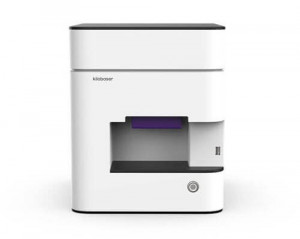
KiloBaser is a DNA synthesizer, designed to make DNA oligos creation as easy as brewing a cup of coffee- right on your lab bench in just 60 minutes, with no special training required. In this interview, Kilobaser CEO Alexander Murer describes the technology behind Kilobaser and its uses for DNA researchers.
Please describe the story behind Kilobaser: What sparked the idea, and how has it evolved so far?
I was studying molecular biology in Graz, Austria and I was a bit annoyed by studying because it was very theoretical and I was more into doing practical stuff. So, during my studies, I started to build lab devices in my free time. That might sound fancy but in the beginning, I just built some heaters and steerers, nothing too technical.
While building lab devices, I came up with the idea to build a community lab, because the main issue we had at university was that we couldn’t access a lab. We had courses, but we couldn’t experiment on our own. I contacted all my friends and colleagues and we founded a community biohacker space in Graz called Open Biolab.
When you have your own lab you start thinking about how you can be self-sustaining, financially. We got interested in DNA because it’s obviously the main building block for any development in a life science lab. I was still building lab devices, tearing apart old devices from the collective old lab devices that companies have contributed to our noncommercial community lab.
At some point I decided, with a couple of friends, to build a DNA synthesizer. I had checked the technology and it seemed pretty straightforward, but when we delved deeper into microfluidics, it became much more complicated. That’s when we joined the accelerator program and started building our company.

What does your machine do? How does it work?
A DNA synthesizer is a machine that produces artificial DNA. It’s used in research labs to produce DNA. In a genetic engineering lab, the DNA is the building block for everything. It’s the programming language for life. So you frequently need DNA and the DNA synthesizer builds the DNA you want or need for your research.
The technology itself is already more than 40 years old, but what we specifically built is a very special kind of DNA synthesizer. We call it the Espresso machine of DNA synthesizers because it’s a very simple and convenient personal DNA synthesizer. It allows any researcher to synthesize DNA very easily.
You can think about a DNA synthesizer as a small desktop chemical factory. It pumps around liquids and reagents, and by that, it creates DNA strands.

Load the device with its single reagent cartridge, insert a new fluid chip, and you are ready to enter your desired DNA sequence using the on-board touch screen or any mobile device.
Since currently there are only complicated DNA synthesizers, they need a lot of care and they’re very expensive to use. That’s why most labs rely on outsourced DNA synthesis, meaning they order DNA from external companies. This DNA usually gets shipped within a couple of days. But with our desktop machine, you can have DNA in an hour, making research so much faster.
Imagine you’re a computer programmer and you program something and it needs a week or a couple of days until the code gets delivered to you. Obviously, that delays development and makes everything slower. Our machine is designed to accelerate research.
How has COVID-19 affected your business and industry?
I’d say it’s a dual relationship. A lot of capital and motivation are going towards developing a vaccine and treatment for COVID-19, so that was a big push for us. On the other hand, a lot of life science labs were shut down during the crisis. Of course, research budgets in all countries are tighter now, so it’s hard to tell what exactly is the impact. I suppose it will clarify as time goes by.
Which trends and technologies do you expect to see more of in the coming years?
We use a chemical way to synthesize DNA, but there’s also a new enzymatic way to do it where you use enzymes to produce DNA. That’s basically what all your cells do, they produce DNA with enzymes. So in the future, I believe we’ll see DNA synthesizers that work with enzymes rather than pure chemical synthesis. I don’t think they’re going to be better than the current systems but still, it’s quite an interesting technology.
I think the rest of is all about the COVID-19 vaccine at the moment. Although we’re not actively developing a vaccine, we do hope to assist these efforts as a secondary contributor through our machine.
How do you envision the future of your industry?
Life Science is a very fast-changing, innovative field, and probably the science area that has the largest impact on people’s lives. It’s the fastest moving research area, I’d say, in recent years, so we’re going to see a lot of new discovery and innovation. Genetic engineering has become a lot easier in the past few years. CRISPR cas9 has become a keyword now. And so I think we’ll see life science solving many issues around medicine, nutrition, and food.
One big trend we see is nutrition and veganism. Artificial meat and protein substitutes will be a big thing. We’re facing the climate crisis, so I think life science, in general, can help to find solutions.
And of course, in the end, life science is all about learning about ourselves, because DNA, the whole process in our body is still very unknown, at least large parts of it.
So I think there are many beautiful things to come and many interesting developments which will affect us and probably manipulate us.
I expect to see greater use of Gene therapy, both for healing diseases and for enhancing health. I also see a growing interest in life longevity extension as well as making ourselves more intelligent using gene therapy.

